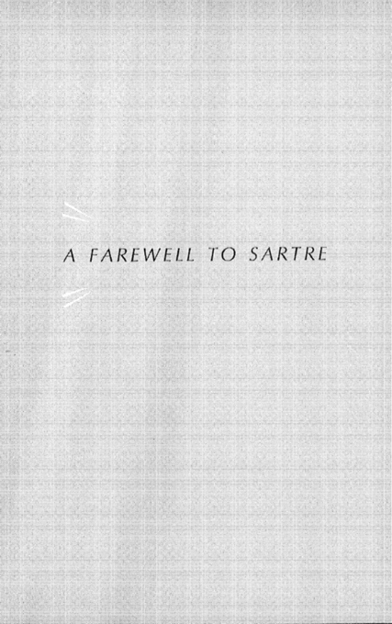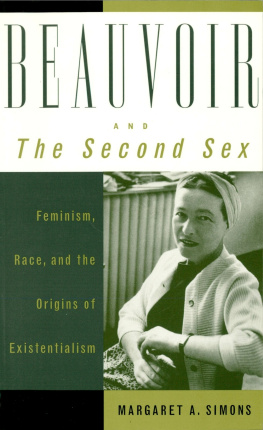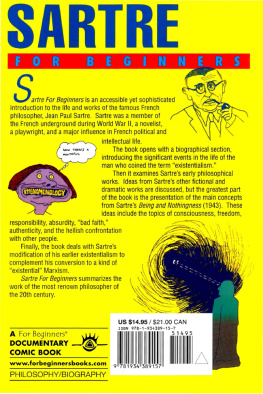ALSO BY THE AUTHOR
NONFICTION
The Second Sex
A Very Easy Death
Memoirs of a Dutiful Daughter
The Prime of Life
Force of Circumstance
The Coming of Age
FICTION
She Came to Stay
The Blood of Others
All Men Are Mortal
The Mandarins
The Woman Destroyed
Les Belles Images
When Things of the Spirit Come First
English translation Copyright 1984 by Patrick OBrian
All rights reserved under International and Pan-American Copyright Conventions. Published in the United States by Pantheon Books, a division of Random House, Inc., New York. Translation hardcover edition first published in the United States by Pantheon books, a division of Random House, Inc., in 1984.
Originally published in France as La Crmonie des adieux by Editions
Gallimard. Copyright 1981 by Editions Gallimard.
Library of Congress Cataloging in Publication Data
Beauvoir, Simone de, 1908
Adieux: a farewell to Sartre.
Translation of La Crmonie des adieux.
1. Sartre, Jean Paul, 1905 Biography. 2. Sartre, Jean Paul, 1905 Interviews. 3. Beauvoir, Simone de, 1908 Biography. 4. Authors, French20th centuryBiography. I. Sartre, Jean Paul, 1905 . II. Title.
PQ2637.A82Z56413 1984 848.91409 [B] 83-19327
eISBN: 978-0-307-83218-4
Cover design by Peter Mendelsund
v3.1
To those who loved Sartre
who do love him
who will love him
CONTENTS

THE FAREWELL CEREMONY
This is the first of my booksthe only one no doubtthat you will not have read before it is printed. It is wholly and entirely devoted to you; and you are not affected by it.
When we were young and one of us gained a brilliant victory over the other in an impassioned argument, the winner used to say, There you are in your little box! You are in your little box; you will not come out of it and I shall not join you there. Even if I am buried next to you there will be no communication between your ashes and mine.
When I say you, it is only a pretense, a rhetorical device. No one hears it. I am speaking to no one. In reality it is Sartres friends that I am talking tothose who would like to know more about his last years. I have described them as I lived through them. I have spoken about myself a little, because the witness is part of his evidence, but I have done so as seldom as possible. In the first place because that is not what this book is about, and then because, as I replied to a friend who asked me how I was taking it, These things cannot be told; they cannot be put into writing; they cannot be formed in ones mind. They are experienced and that is all.
This narrative is chiefly based on the diary I kept during those ten years, and on the many testimonies I have gathered. My thanks to all those whose written or spoken words have helped me to recount Sartres last days.
1970
Throughout his life Sartre never ceased calling himself into question; he did not underestimate what he called his ideological interests, but he did not wish to be wholly taken over by them. He often thought it right to think against himself, trying hard to break bones inside his head. The political upheavals of 1968, in which he was involved and which affected him deeply, led him to reflect upon the intellectuals role and to modify his conception of it.
He often explained his views on this point. Up until that time Sartre had seen the intellectual as someone who was tormented by the contradiction between the universality of practical knowledge and the exclusiveness of the ruling class which had produced himhe was thus the incarnation of the guilty conscience as Hegel defines it, and soothing his conscience by his very awareness of its guilt, he felt that it allowed him to be on the side of the proletariat. Sartre now thought it was necessary to go beyond that stage. Against the classic intellectual he set up the new intellectual who endeavors to become integrated with the masses so as to bring about the triumph of true universality.
Sartre tried to follow this line of conduct even before he had distinctly formulated it. In the fall of 1968 he undertook the editing of Interluttes, a bulletin that circulated among the political activists. He had met Geismar several times and was keenly interested in his idea of publishing a paper in which the masses could speak. It came into existence however when Geismar joined the Gauche proltarienne (G. P.) and he and the Maoists brought out La Cause du peuple. It had no owner, was written directly or indirectly by the workers, and was sold on the streets by the militants. Its aim was to give an idea of the struggles carried on by the working class in France from 1970 onward. It was often hostile to the intellectuals and, where Roland Castros trial was concerned, to Sartre himself.
After certain articles in La Cause du peuple violently attacked the government, its first two editors, were arrested. Geismar and other militants suggested that Sartre should take their place. He agreed without hesitation, because he thought that the weight of his name might be useful to the Maoists. I cynically tipped the scales with the fact that I was well known, he said later during a lecture in Brussels. From that point on the Maoists were persuaded to revise their opinion of the intellectuals and their tactics toward them.
The first issue of La Cause du peuple edited by Sartre came out on May 1, 1970. The authorities did not attack him, but the minister of the interior ordered the seizure of each number at the printing plant. Fortunately, the printer managed to get most of the copies out and away before they were taken. The government then went after the vendors of the paper, who were brought before a special court and charged with reconstituting an organization that had been banned. However Sartre and I and several friends sold the paper in the heart of Paris without being seriously disturbed. One day the authorities grew tired of the pointless struggle and it began to be sold in the kiosks. An association of Friends of La Cause du peuple was formed, with Michel Leiris and myself at the head of it. Associations have to be declared, and an official receipt is delivered. This was at first refused to us and we had to appeal to the administrative court to get it.
In June 1970 Sartre helped to found the Secours rouge, an organization whose aim was to struggle against repression. The national steering committee, in a declaration largely written by Sartre, stated among other things:
Secours rouge will be a democratic, legally declared and independent association, its essential aim will be to ensure the political and legal defense of the victims of repression and to provide them and their families with material and moral support, no one being barred
justice and freedom cannot be defended without organizing solidarity among the people. Secours rouge, which arises from the people, will help them in their struggle.
The organization included the main leftist groups, Tmoignage chrtien, and a number of well-known people. Its chief purpose was to resist the wave of arrests initiated by Marcellin after the dissolution of the G.P. A great many militants were in prison. What had to be done was to collect information on their cases and decide what action to take. Several thousand people belonged to














